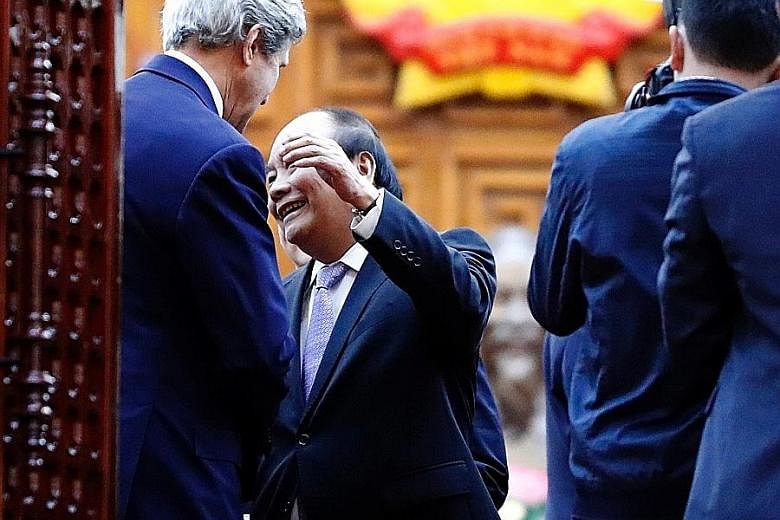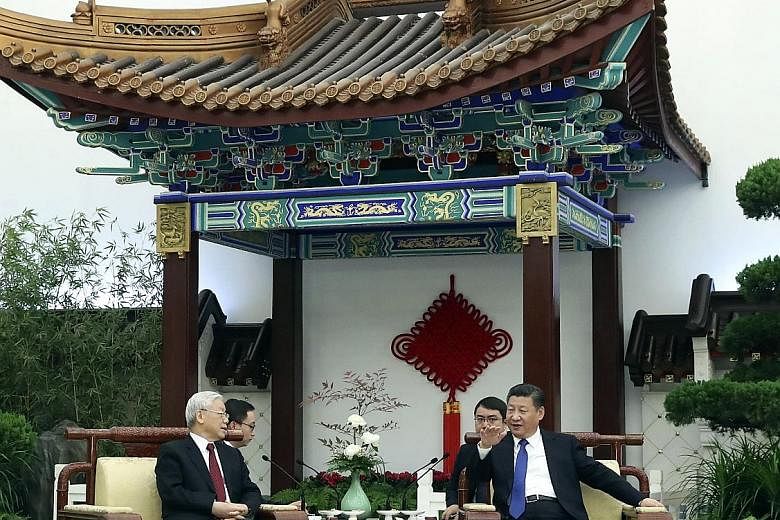HANOI • Vietnam is moving to firm up key relationships after the rise of unpredictable politicians in the United States and the Philippines upset its trade and security strategy.
A trio of high-profile diplomatic exchanges over the next week highlights a careful balancing act as US President-elect Donald Trump prepares to take office.
Vietnamese Communist Party chief Nguyen Phu Trong began a four-day visit on Thursday to China - Vietnam's biggest trading partner - that includes a meeting with President Xi Jinping. Outgoing US Secretary of State John Kerry arrived in Hanoi yesterday for talks. And next week, Japanese Prime Minister Shinzo Abe makes his first trip to Vietnam since 2013.
During their meeting on Thursday, Mr Xi said the two countries were as "comrades and brothers", telling Mr Trong that China viewed their relations from a long-term perspective and hoped that the two countries would properly manage and control disputes, according to the official Xinhua news agency.
Mr Xi also proposed expanding military and security cooperation.
Vietnam, in recent months, has watched as key parts of its economic and foreign policy were thrown into question. Mr Trump vowed to kill the Trans-Pacific Partnership (TPP) - a trade deal in which Vietnam was seen as one of the biggest winners - while new Philippine President Rodrigo Duterte shifted towards China, eschewing a more coordinated approach with Vietnam over territorial disputes.
Vietnam's leaders are concerned about political changes in Europe, the US and the Philippines, said Dr Tran Viet Thai, deputy director-general of the Diplomatic Academy of Vietnam in Hanoi.
"It's a fast-changing world, an unpredictable world," he said. "We have to react very carefully."
Madam Ton Nu Thi Ninh, a former ambassador to the European Union and Belgium and former vice-chair of the national assembly's Foreign Affairs Committee, said the focus would be on the new US administration. She did not think Vietnam would move closer to China economically if the TPP was unsuccessful.
Vietnam already has "several free trade agreements" in place and, like China, is a part of the Regional Comprehensive Economic Partnership, she said. Madam Ninh added that "Vietnam has also boosted trade relations with Russia and Europe".
Relations with China, shaped by decades of war and suspicion, have been strained by Beijing's moves to reclaim land and increase its military presence in the South China Sea. Ties hit a low in 2014, when China put an oil rig within Vietnam's exclusive economic zone.
Tensions dissipated somewhat after Prime Minister Nguyen Xuan Phuc's six-day trip to China last September, his first since taking office in April. Chinese state media heralded it as "a new era of stronger bilateral ties". Vietnamese state media used similar language to preview Mr Trong's trip this week, saying it showed the country wanted to deepen ties with China and create a peaceful and stable environment.
"China and Vietnam do have sources of tension on the national interests level that cannot be easily reconciled," said Professor Zhang Mingliang, from Jinan University's South-east Asia Research Institute. "However, at this moment of geopolitical uncertainty, it'd serve the interests of both to aim for a steady, working bilateral framework under which business can be done."
As for Mr Trump, Dr Thai said, Vietnam's leaders are at a loss. "The way he does politics will be quite different - whether or not it will be good or bad, we don't know. However, we do not think the US national interests in Asia will change."
BLOOMBERG


